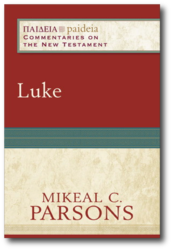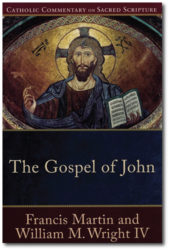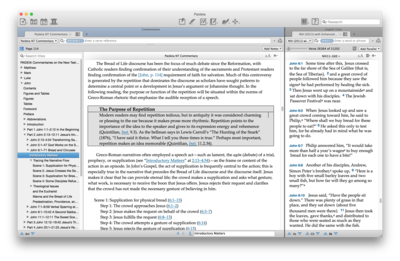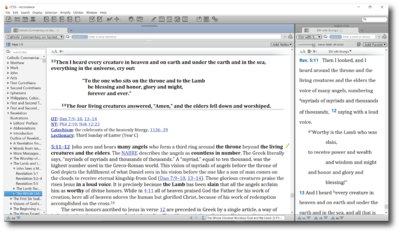Years ago—in the dark ages before the advent of Bible software—a friend and I were talking about the impressive personal library of a mutual acquaintance. “I’ve heard that John [not his real name] has over 100 volumes about the Book of Revelation alone!” I said.
“Yes, I’ve been to his house, and I’ve seen all those books, but I was not impressed,” my friend replied.
“Really—why not?” I asked.
“Well, it’s true that John has over 100 books on Revelation, but it doesn’t matter because they all say the same thing!”
And that’s the danger, isn’t it? Those of use who have taken serious interest in the study of the scriptures risk falling into the trap of reading from only a very narrow perspective. My seminary studies taught me to value historical-critical, mostly Protestant viewpoints about the Bible. There’s nothing overtly wrong with this perspective, but it’s important to remember that there are other ways of looking at the same content.
This week, we are pleased to introduce two new commentary series from Baker Academic to the Accordance Library. For some (but certainly not all) of our users, these series will offer a wider perspective than what they might be accustomed. Reading different perspectives certainly doesn’t mean that all approaches are equal—discernment is always necessary—but it is surely hubris to think we can’t learn from others who look at our familiar categories in a different light.
New! Paideia Commentaries on the New Testament
 First, you will want to explore the 14-volume Paideia Commentaries on the New Testament. This series takes its name from the Greek word παιδεία, which means “discipline, instruction, training” (UBS Lexicon). That’s because the Paideia series is aimed primarily at “students—including MA students in religious and theological studies programs, seminarians, and upper-divisional undergraduates—who have theological interests in the biblical text” (from the Foreword).
First, you will want to explore the 14-volume Paideia Commentaries on the New Testament. This series takes its name from the Greek word παιδεία, which means “discipline, instruction, training” (UBS Lexicon). That’s because the Paideia series is aimed primarily at “students—including MA students in religious and theological studies programs, seminarians, and upper-divisional undergraduates—who have theological interests in the biblical text” (from the Foreword).
The Paideia series is essentially a literary commentary. That means its focus is on the final form of the text and not quite so interested in traditional historical-critical issues or development of the text. Instead, it emphasizes literary and rhetorical aspects. The focus is on the reader—how the text impacts the person directly interacting with it. This places the Paideia commentary series in line with many literary treatments studied and taught in liberal arts programs at many universities.
This is not a verse-by-verse commentary, but instead deals with larger rhetorical units. Most original language content is transliterated, so a formal knowledge of Greek is not required. The reader will find sidebars interspersed within the text that present the voices of figures from the Greco-Roman world on similar themes from the biblical passage.
And speaking of looking at the Bible from different perspectives, the individual volumes of the Paideia series have been written by scholars representing Protestant, Catholic, and Eastern Orthodox backgrounds.
Accordance users will be pleased to know that our developers have analyzed the content of the Paideia Commentaries on the New Testament and have identified and tagged the following fields: Reference, Titles, English Content, Scripture, Greek Content, Hebrew Content, Transliteration, Translation, Manuscripts, Bibliography, Authors, Captions, Image Credits, Tables, and Page Numbers. The application of such detailed category tagging means that you can quickly find the exact information for which you’re looking.
Click the above image for a full size product illustration.
Paideia Commentaries on the New Testament
$399
New! Catholic Commentary on Sacred Scriptures
 The second series new to the Accordance Library this week is the 11-volume Catholic Commentary on Sacred Scriptures (CCSS). Fair or not, in the past, the Catholic Church sometimes had the reputation for ignoring personal or group Bible study. Vatican II changed that perspective, however, with a renewed encouragement to explore the Scriptures; and the CCSS commentary series directly reflects this.
The second series new to the Accordance Library this week is the 11-volume Catholic Commentary on Sacred Scriptures (CCSS). Fair or not, in the past, the Catholic Church sometimes had the reputation for ignoring personal or group Bible study. Vatican II changed that perspective, however, with a renewed encouragement to explore the Scriptures; and the CCSS commentary series directly reflects this.
The CCSS has a two-fold audience in mind. On one hand it is written for those training in pastoral ministry. However, it is also aimed at anyone “interested in studying Scripture to understand their faith more deeply, to nourish their spiritual life, or to share the good news with others” (from the Foreword). Less emphasis is given to technical questions, allowing the content to focus on matters of life and faith.
The New American Bible is the primary translation used in the CCSS. As the name implies, this is primarily a Catholic commentary, complete with Nihil obstat and imprimatur; however, the authors aim for a wider audience drawing not only on traditional Catholic teaching, but Protestant and Orthodox interpretations as well.
The Accordance developers have carefully analyzed the CCSS and have identified and tagged the following types of content: Reference, Titles, English Content, Scripture, Transliteration, Translation, Bibliography, Authors, Captions, Image Credits, and Page Numbers. Tagging these very specific fields allows the Accordance user to search for exact types of information in a quick and efficient manner.




